October 31, 2025
Top 9 Best Hiring Software Picks for 2025 Success
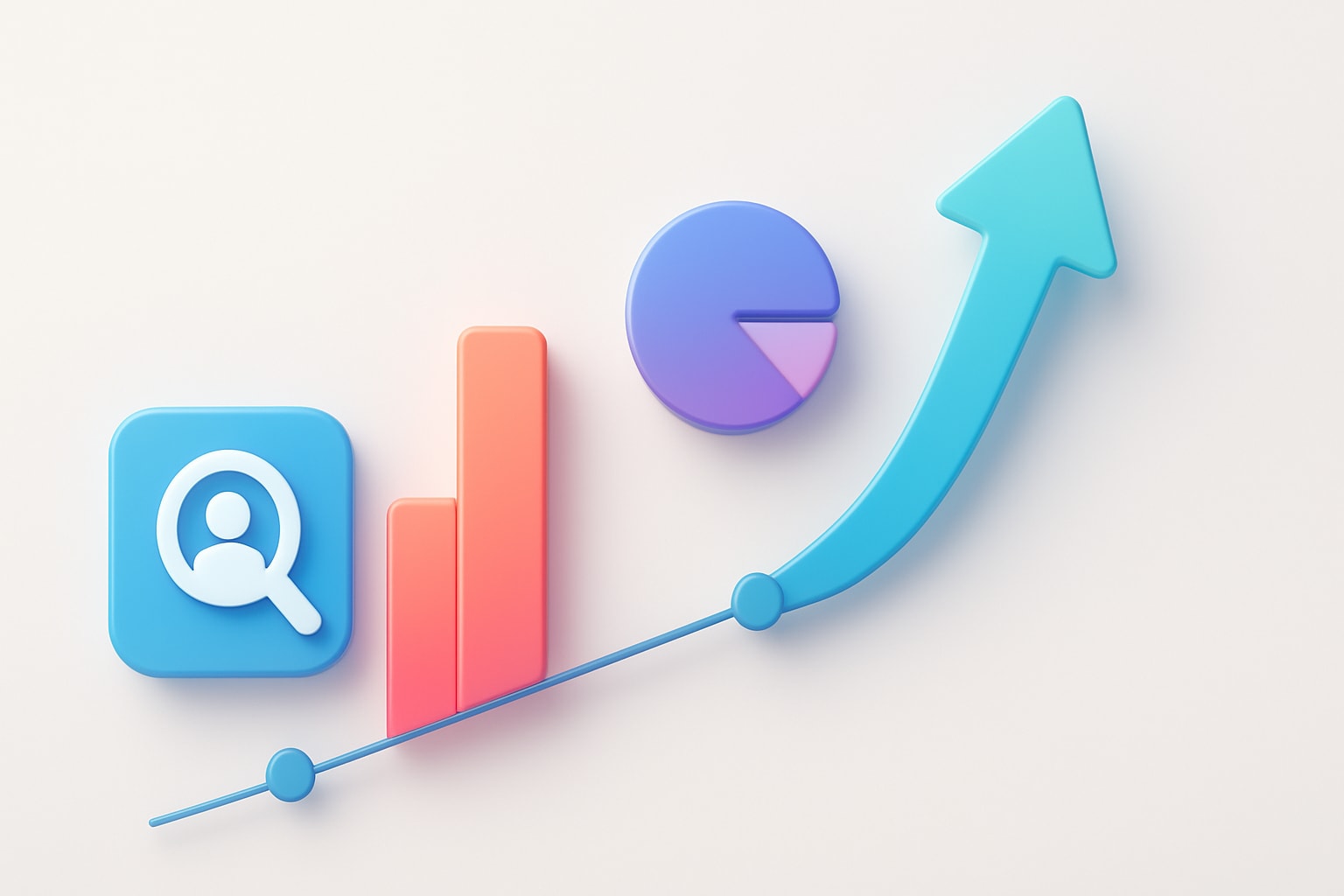
As businesses enter 2025, the demand for smarter, more efficient hiring tools has never been higher. Companies face constant challenges such as talent shortages, unconscious bias, and tight timelines, making traditional recruitment strategies less effective.
This article explores the best hiring software available for 2025, designed to help organizations recruit top talent quickly and fairly. You will discover the top nine solutions, their standout features, unique advantages, and guidance on which types of businesses each option best serves.
Why Hiring Software Is Essential for 2025 Recruitment Success
The recruitment landscape is undergoing a radical shift as we move into 2025. Companies face mounting pressure to attract and secure top talent amidst widespread skill shortages, growing competition, and rapidly evolving candidate expectations. Traditional hiring methods are struggling to keep up, often resulting in lengthy processes, increased costs, and missed opportunities for both employers and job seekers.
In this environment, the best hiring software emerges as a strategic asset for organizations looking to thrive. These platforms directly address some of the most persistent challenges in recruitment, such as manual workload, inconsistent candidate evaluation, and unconscious bias. By streamlining repetitive tasks like CV screening and interview scheduling, hiring software frees up valuable time for recruiters to focus on building relationships and strategic decision-making.
AI, automation, and data analytics have become the backbone of the best hiring software. Advanced systems use machine learning to analyze candidate data, predict job fit, and minimize bias in the selection process. According to industry reports, companies leveraging AI-powered recruitment tools can reduce their time-to-hire by up to 50% and lower overall hiring costs by as much as 30%. These improvements are not just theoretical. Leading organizations have transformed their talent acquisition outcomes by adopting intelligent hiring technology, reporting increased candidate quality and better retention rates.
Another key benefit of the best hiring software is its ability to scale alongside business growth. Modern solutions offer seamless integration with existing HR systems, including payroll, onboarding, and background checks. This interconnectedness ensures that data flows smoothly across platforms, minimizing errors and providing a unified view of the hiring pipeline. For organizations expanding into new markets or handling high-volume recruitment, scalable software is essential to maintain speed and consistency.
Candidate experience also plays a pivotal role in recruitment success. The best hiring software delivers automated communications, personalized feedback, and intuitive application processes. These features help organizations stand out to top candidates, who are increasingly selective about where they apply and work. A positive candidate journey not only boosts employer branding but also increases the likelihood of offer acceptance.
As technology advances, hiring software must adapt to new workforce trends and regulatory requirements. Solutions that incorporate AI and automation are better equipped to handle the complexities of remote work, global talent pools, and evolving compliance standards. For those interested in a deeper understanding of these advancements, the Benefits of AI in recruitment provides further insights into how artificial intelligence is shaping the future of talent acquisition.
In summary, investing in the best hiring software is no longer optional for organizations aiming to remain competitive in 2025. The right platform delivers measurable improvements in efficiency, quality, and equity, while positioning companies to adapt to whatever the future holds.
Top 9 Best Hiring Software Picks for 2025 Success
Choosing the best hiring software is more important than ever in 2025. With the rapid evolution of recruitment technology, businesses need solutions that offer efficiency, intelligence, and scalability. If you want a broader perspective or a side-by-side view, check out this Best ATS software comparison for additional insights.
Below, we reveal the top 9 platforms shaping the future of hiring. Each is selected for its standout features, unique benefits, and suitability for different organizational needs.
Klearskill
Klearskill secures its position among the best hiring software for 2025 with a powerful AI-driven recruitment engine that transforms how companies handle high-volume applications. Its automated CV screening and instant candidate shortlisting slash manual review times, making it a top pick for organizations needing speed and accuracy.

Startups can access Klearskill for free, while all users benefit from a risk-free trial. Larger enterprises can choose custom plans that scale as hiring demands grow. The platform’s deep candidate analysis and customizable AI allow for precise matching, reducing bias by up to 99 percent and achieving up to 97 percent match accuracy, especially for technical roles.
Seamless integration with existing applicant tracking systems and a visual workflow manager help teams stay organized. The advanced analytics dashboard delivers actionable insights, supporting smarter hiring decisions. Klearskill’s plug-and-play deployment ensures quick onboarding, making it ideal for startups, SMBs, and enterprises dealing with large applicant pools.
While rapid shortlisting and bias-free evaluation are clear advantages, organizations may need initial onboarding to optimize the platform’s customization features. Still, for companies seeking the best hiring software that adapts to diverse recruitment needs, Klearskill stands out.
Greenhouse
Greenhouse ranks high on the list of best hiring software thanks to its comprehensive applicant tracking system and structured hiring workflows. Designed for mid-sized to large organizations, it offers a highly configurable platform that grows with your recruitment strategy.
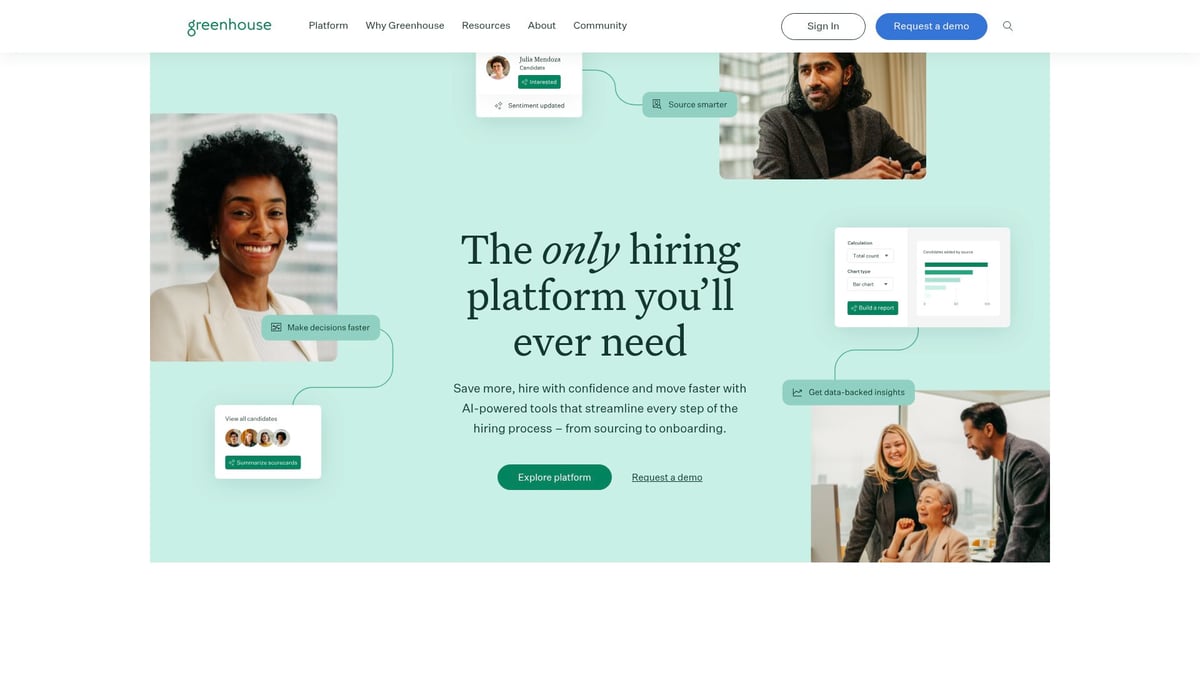
Pricing is tailored to each business, ensuring you only pay for what you need. Greenhouse’s standout features include interview scheduling, scorecard-driven evaluations, onboarding tools, and robust analytics dashboards. Its data-driven approach promotes consistent, bias-minimized hiring, while collaborative tools enhance team participation throughout the hiring journey.
Integration is a major strength, with Greenhouse supporting a wide range of HR tools and job boards. This flexibility means you can connect your existing HR tech stack for a unified workflow. The platform’s focus on candidate experience, from application to onboarding, helps attract top talent in competitive markets.
While the learning curve can be steep for new users, especially in smaller organizations, the wealth of features and strong reporting capabilities justify the investment for those needing the best hiring software for scalable growth.
Workable
Workable is a cloud-based solution that consistently ranks among the best hiring software for businesses aiming for end-to-end hiring management. Its straightforward pricing starts at $149 per month for the Starter plan, making it accessible to growing teams and SMBs.
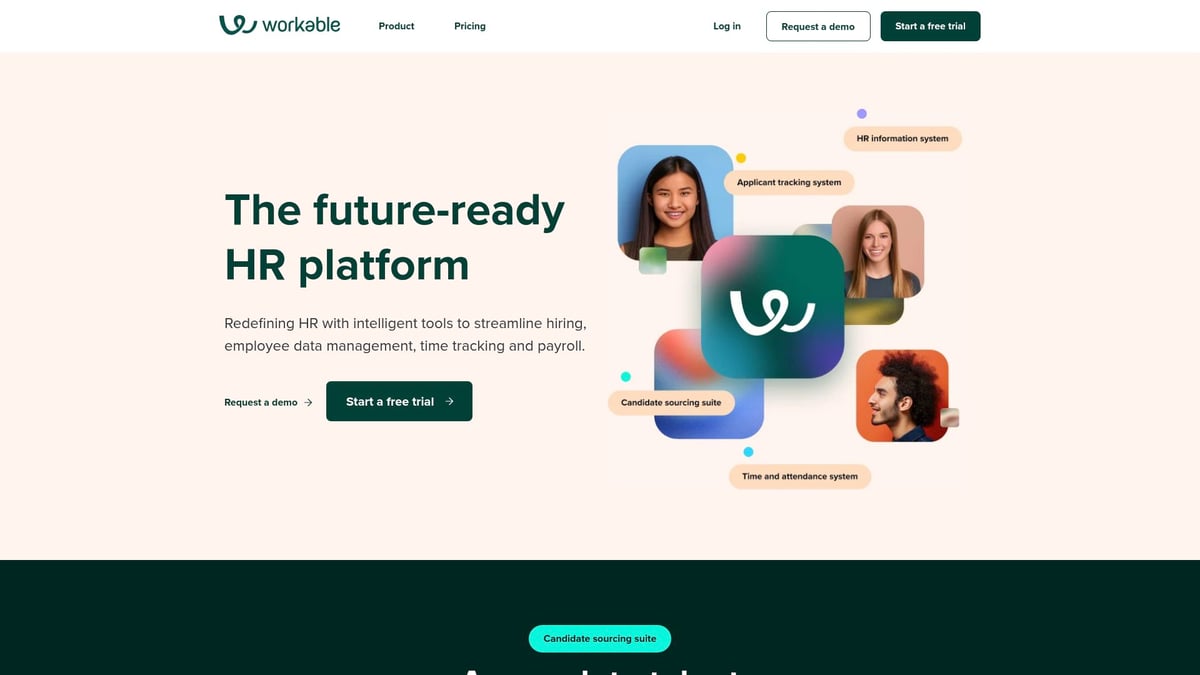
Key features include AI-powered sourcing, automated candidate screening, and one-click job board posting to over 200 boards globally. The collaborative hiring tools and mobile app support enable teams to review candidates and schedule interviews on the go, streamlining the recruitment process.
Workable’s user-friendly interface is a major draw, reducing time spent on training and onboarding. The platform’s scalability means as your company grows, Workable can easily accommodate increased hiring volume and complexity.
Advanced features, such as deep analytics and enhanced automation, are available in higher-tier plans. While this may require some businesses to upgrade as their needs evolve, Workable remains a top choice for organizations seeking the best hiring software that balances affordability, reach, and ease of use.
Lever
Lever combines the best hiring software functionalities of an applicant tracking system and a candidate relationship management tool. This hybrid approach is perfect for companies committed to proactive sourcing and long-term talent relationships.

Pricing is custom, aligning with your company’s size and requirements. Lever’s core features include pipeline nurturing, automated workflows, diversity recruiting tools, and comprehensive analytics. The platform’s DEI-focused features support unbiased hiring, helping organizations build more inclusive teams.
Robust reporting tools give hiring managers visibility into every stage of the recruitment process. Lever’s CRM capabilities enable ongoing engagement with passive candidates, setting it apart for businesses with ongoing or specialized hiring needs.
While Lever’s depth and customization can be complex for smaller teams, its rich feature set makes it one of the best hiring software options for organizations prioritizing talent relationship management and diversity initiatives.
Breezy HR
Breezy HR stands out as one of the best hiring software solutions for fast-growing businesses and startups seeking simplicity and speed. Its intuitive, drag-and-drop interface makes pipeline management effortless, even for teams with limited recruitment experience.
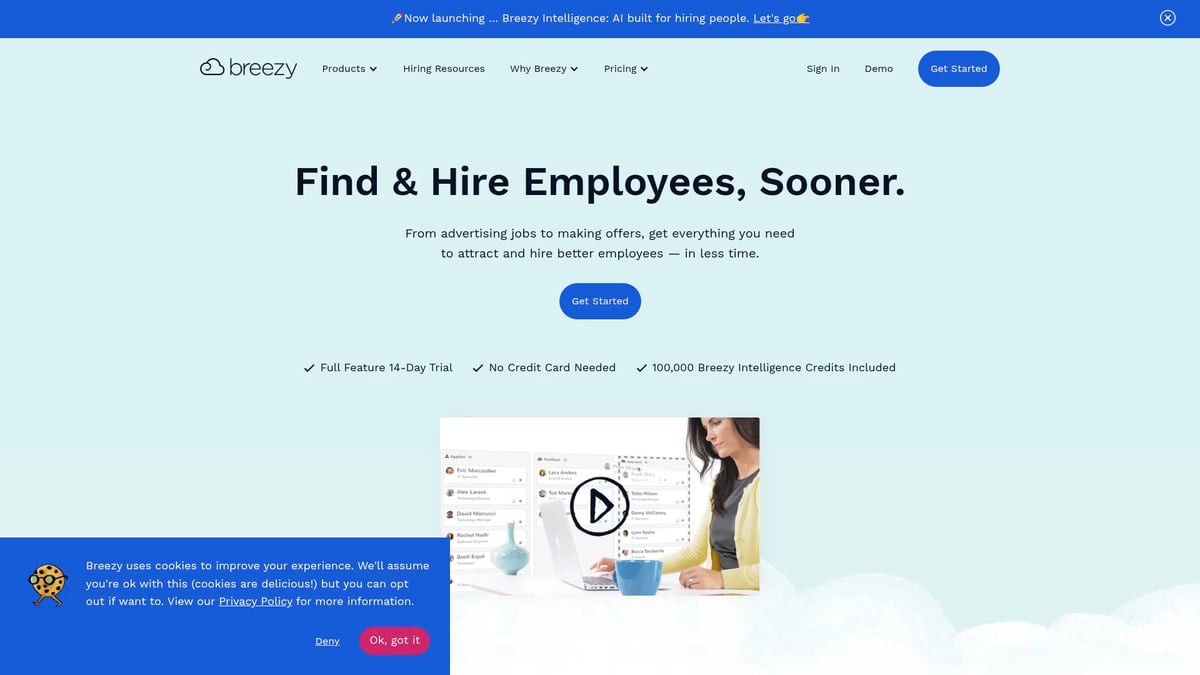
The platform offers a free plan with core features and a Business plan starting at $157 per month for more advanced needs. Automated interview scheduling, video interviewing, and visual dashboards help streamline the entire hiring journey, saving valuable time for busy teams.
Customization is a strong point, allowing users to tailor hiring stages and workflows to fit unique processes. Breezy HR’s affordability and ease of use make it accessible for SMBs and startups looking to scale quickly.
While advanced analytics are reserved for higher-tier plans, Breezy HR delivers the essential features needed from the best hiring software without overwhelming users with complexity. Its user-friendly design and affordable entry point make it an attractive option for modern organizations.
JazzHR
JazzHR earns its reputation as one of the best hiring software platforms for small to mid-sized businesses that need flexibility and cost-effectiveness. With pricing starting at just $75 per month, JazzHR provides a powerful suite of features without breaking the bank.
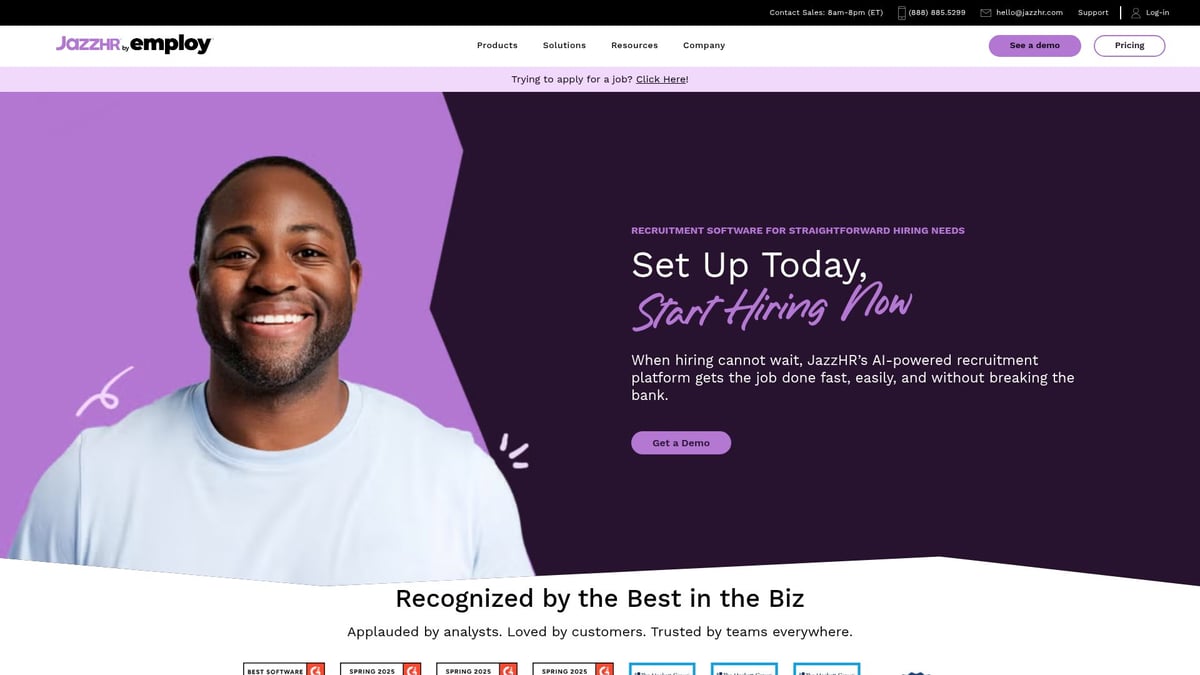
Customizable workflows let teams design the recruitment process that fits their unique needs. Unlimited users, job syndication to multiple boards, and integrated offer management support seamless collaboration and faster time-to-hire.
JazzHR’s straightforward setup means companies can launch their recruitment campaigns quickly. The platform’s scalable architecture ensures it grows with your business, while its budget-friendly pricing appeals to SMBs and agencies.
Although JazzHR offers fewer enterprise-level integrations, it excels at delivering the core capabilities that define the best hiring software for smaller organizations. Its simplicity and value make it a favorite among budget-conscious recruiters.
SmartRecruiters
SmartRecruiters is an enterprise-grade talent acquisition suite that consistently ranks among the best hiring software for global organizations. Its focus on international hiring is evident through multi-language support and strong marketplace integrations.
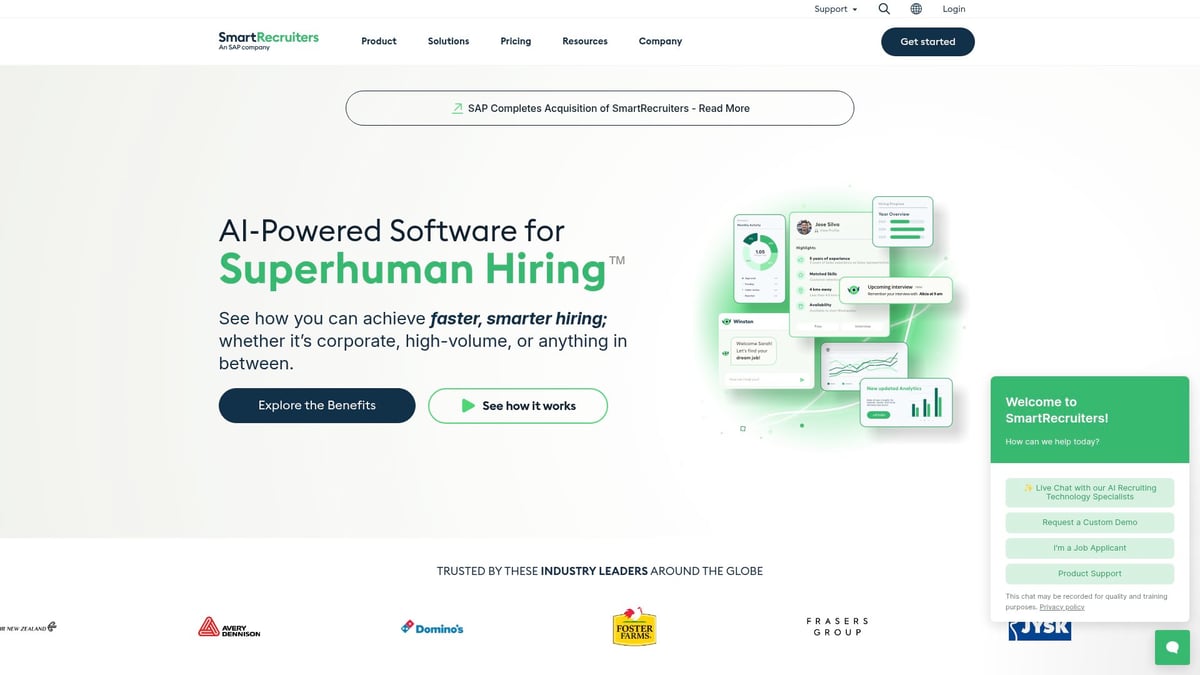
Pricing is custom, tailored to the complexity and scale of each organization. SmartRecruiters’ key features include AI-powered sourcing, collaborative hiring tools, and a comprehensive analytics suite. These capabilities help large enterprises attract, manage, and onboard talent across multiple regions.
The platform’s mobile capabilities and user-friendly interface enhance the candidate and recruiter experience alike. SmartRecruiters is especially well-suited for multinational companies seeking consistency and compliance in their recruitment processes.
While the platform may be complex for smaller businesses, its scalability and global reach position it as a top contender for the best hiring software in enterprise environments.
iCIMS Talent Cloud
iCIMS Talent Cloud is a comprehensive talent acquisition platform designed to support medium and large enterprises with complex hiring requirements. As one of the best hiring software choices, it offers advanced automation and seamless integration with existing HR systems.
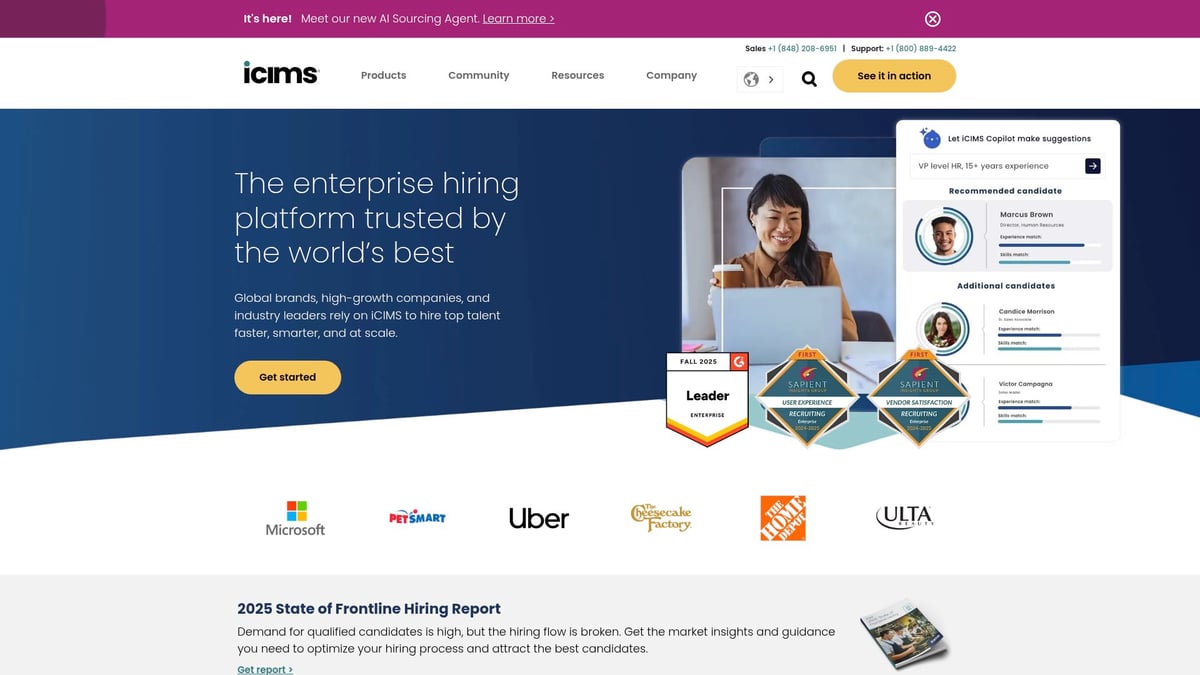
Pricing is available upon request, ensuring solutions are customized to organizational needs. iCIMS delivers end-to-end recruitment automation, an integrated CRM, AI-powered candidate matching, and robust onboarding tools. The platform’s compliance support and deep analytics drive smarter, more efficient hiring decisions.
The seamless data flow between modules allows recruiters to manage the entire hiring lifecycle from a single dashboard. iCIMS’ scalability and flexibility make it ideal for organizations experiencing rapid growth or frequent changes in hiring needs.
While implementation can be time-intensive, the investment pays off for companies seeking the best hiring software to handle high-volume or specialized recruitment.
Jobvite
Jobvite rounds out our list of the best hiring software for 2025, offering an integrated platform that combines applicant tracking, CRM, and recruitment marketing. Its modular pricing is tailored to company size and required features, making it adaptable for various business models.
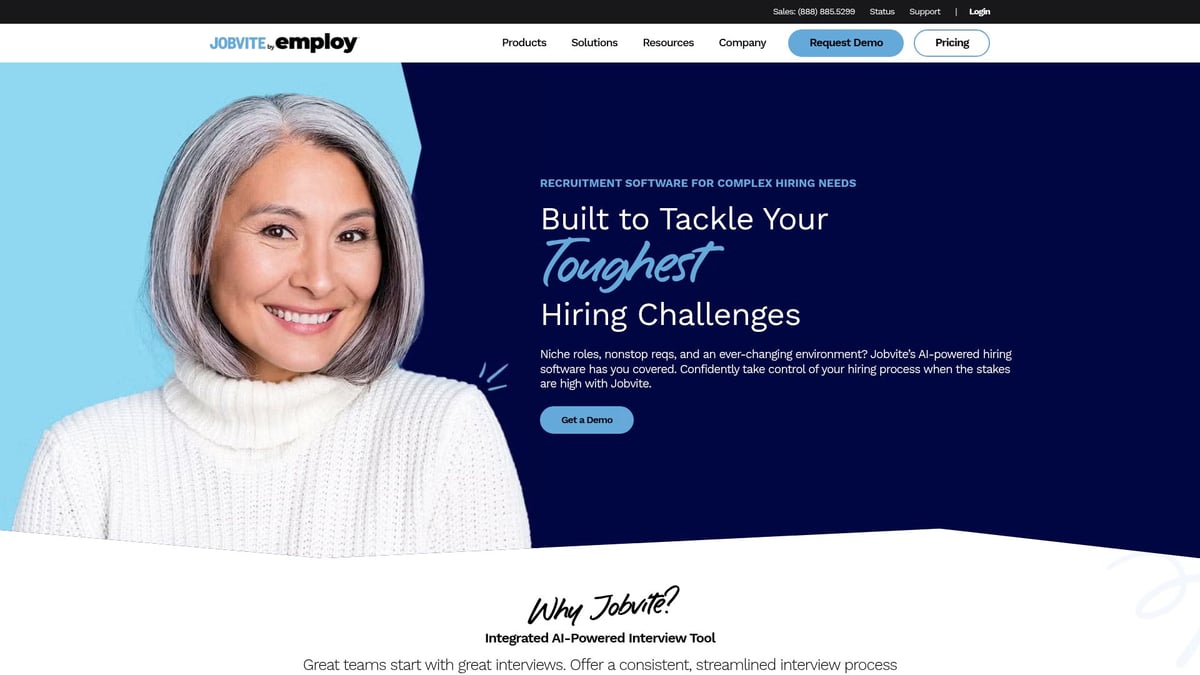
Core features include social recruiting, employee referral management, detailed analytics, and onboarding solutions. Jobvite’s recruitment marketing tools empower organizations to strengthen employer branding and engage candidates from the first touchpoint.
Automation features streamline repetitive tasks, allowing recruiters to focus on building relationships. The platform is particularly valuable for companies prioritizing candidate engagement and a strong employer brand.
While Jobvite’s robust offerings can be costly for smaller firms, its comprehensive feature set and marketing capabilities make it a top choice for organizations seeking the best hiring software with a focus on candidate experience and brand presence.
How to Choose the Right Hiring Software for Your Organization
Selecting the best hiring software is a crucial decision for any organization aiming to stay competitive in 2025. The right solution can transform your recruitment process, streamline workflows, and ensure you attract top talent. However, with so many platforms available, narrowing down the options can feel overwhelming.
Start by assessing your unique organizational needs. Consider your company size, the volume of hires you anticipate, and the complexity of your workflows. A small business with occasional hiring will have different requirements than a large enterprise managing hundreds of applications monthly. Think about whether you need basic applicant tracking or a more advanced system with AI-powered features.
Integration is another key factor when evaluating the best hiring software. Your chosen solution should work seamlessly with your existing HR tools, such as payroll, onboarding, and background check systems. Look for platforms that support easy data transfer and minimize manual processes. Comparing must-have features—like automation, advanced reporting, AI-driven screening, and enhanced candidate experience—is essential. For a comprehensive side-by-side analysis, consult this recruitment software comparison guide to see how leading platforms stack up.
Budget considerations also play a significant role. Determine what you are willing to invest and explore options that offer free trials or demo periods. This approach allows you to test key features before making a long-term commitment. Evaluate whether the software’s pricing model fits your hiring volume and growth plans. Remember, the best hiring software delivers lasting value and adapts as your organization evolves.
Vendor reputation and support should not be overlooked. Research customer reviews, case studies, and service availability. Reliable support can make a difference during setup and daily use. Real-world examples show that organizations who match their needs to the right platform see improved efficiency and candidate quality. For instance, companies that prioritize integration and automation often report faster hiring cycles and better team collaboration.
To simplify your decision, create a checklist covering core needs, integration requirements, must-have features, budget limits, and support expectations. Involve key stakeholders in the evaluation process and prioritize solutions that can scale with your business. With a strategic approach, you can confidently select the best hiring software to drive your recruitment success in 2025.
Trends Shaping the Future of Hiring Software in 2025
The landscape of recruitment is shifting rapidly, with the best hiring software evolving to meet the needs of a dynamic workforce. As organizations look ahead to 2025, technology adoption is not just a competitive advantage but a necessity. Understanding these trends helps businesses choose solutions that will remain effective as hiring practices transform.
AI, Automation, and Predictive Analytics in Recruitment
Artificial intelligence and automation are at the core of the best hiring software in 2025. AI-driven platforms streamline candidate sourcing, automate repetitive tasks, and enable predictive analytics to forecast hiring outcomes. With machine learning, recruiters can uncover patterns in candidate data, helping them identify top talent faster and with greater accuracy. According to industry research, companies using AI-powered recruitment tools report significant reductions in time-to-hire and cost-per-hire. For a deeper dive into how these technologies are transforming recruitment, explore this guide on AI tools for talent acquisition.
Diversity, Equity, and Inclusion, Remote Hiring, and Virtual Interviewing
A growing focus on diversity, equity, and inclusion is shaping the best hiring software, as organizations demand features that minimize bias and promote fair evaluations. DEI analytics and anonymized screening are becoming standard. At the same time, remote and hybrid work models are accelerating the adoption of virtual interviewing platforms and tools for distributed teams. The prevalence of remote work in tech and other industries makes it essential for hiring solutions to support seamless collaboration and global candidate pools. To understand how remote work is influencing recruitment software, see the latest remote work trends in software development.
Advancements in Candidate Experience and Skills Intelligence
Candidate experience remains a top priority for the best hiring software. Modern platforms offer chatbot support, automated scheduling, and personalized communication, ensuring candidates feel valued throughout the process. Additionally, integrated skills assessments and talent intelligence features give recruiters deeper insights into each applicant’s fit. These advancements help organizations identify high-potential candidates while maintaining a positive employer brand. As hiring becomes more competitive, delivering a seamless and engaging experience will be a key differentiator.
Future Outlook: Evolving Trends and Expert Perspectives
Looking ahead, the best hiring software will continue to adapt to workforce changes and technological innovation. Predictive analytics and talent intelligence will become even more sophisticated, while DEI and remote hiring capabilities will further expand. Experts predict that ongoing integration with HR systems, deeper automation, and real-time data insights will define the next generation of recruitment tools. Organizations that embrace these trends now will be better prepared for the challenges and opportunities of 2025 and beyond.
